高二外研英语周报2016
英语周报2016-2017学年高二外研版选修七:Module 4 辅
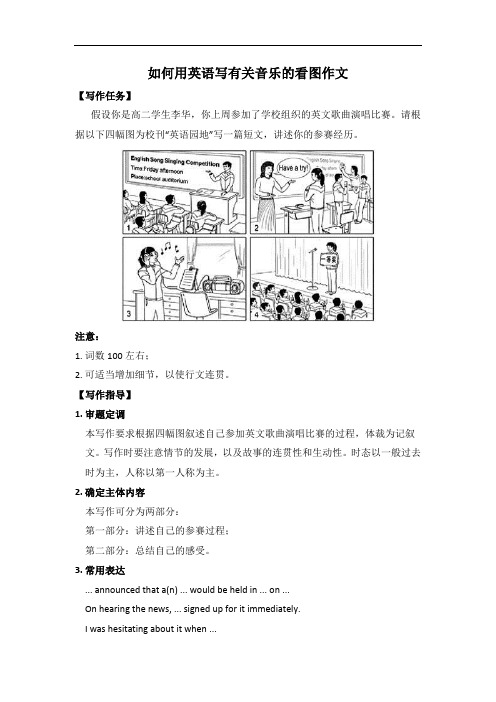
如何用英语写有关音乐的看图作文【写作任务】假设你是高二学生李华,你上周参加了学校组织的英文歌曲演唱比赛。
请根据以下四幅图为校刊“英语园地”写一篇短文,讲述你的参赛经历。
注意:1. 词数100左右;2. 可适当增加细节,以使行文连贯。
【写作指导】1. 审题定调本写作要求根据四幅图叙述自己参加英文歌曲演唱比赛的过程,体裁为记叙文。
写作时要注意情节的发展,以及故事的连贯性和生动性。
时态以一般过去时为主,人称以第一人称为主。
2. 确定主体内容本写作可分为两部分:第一部分:讲述自己的参赛过程;第二部分:总结自己的感受。
3. 常用表达... announced that a(n) ... would be held in ... on ...On hearing the news, ... signed up for it immediately.I was hesitating about it when ...I practised ... again and again ...Then came the big day.I did a really good job and won the first prize, which made me excited.This certainly would be a memorable experience for me!【参考范文】Last Monday, our monitor announced that an English Song Singing Competition would be held in the school auditorium on Friday afternoon. On hearing the news, some classmates signed up for it immediately. I was hesitating about it when my English teacher told me it was a good chance to show my talent. So I decided to have a try.During the following days, I practised the song I had picked again and again until I thought I was well prepared. Then came the big day. I did a really good job and won the first prize, which made me excited.This certainly would be a memorable experience for me!。
英语周报2016-2017学年高二外研版选修八:Module 4 教
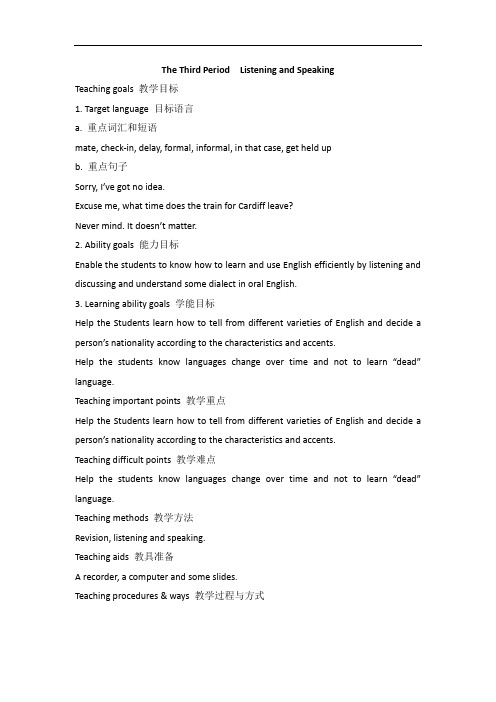
The Third Period Listening and SpeakingTeaching goals 教学目标1. Target language 目标语言a. 重点词汇和短语mate, check-in, delay, formal, informal, in that case, get held upb. 重点句子Sorry, I’ve got no idea.Excuse me, what time does the train for Cardiff leave?Never mind. It doesn’t matter.2. Ability goals 能力目标Enable the students to know how to learn and use English efficiently by listening and discussing and understand some dialect in oral English.3. Learning ability goals 学能目标Help the Students learn how to tell from different varieties of English and decide a person’s nationality according to the characteristics and accents.Help the students know languages change over time and not to learn “dead” language.Teaching important points 教学重点Help the Students learn how to tell from different varieties of English and decide a person’s nationality according to the characteristics and accents.Teaching difficult points 教学难点Help the students know languages change over time and not to learn “dead” language.Teaching methods 教学方法Revision, listening and speaking.Teaching aids 教具准备A recorder, a computer and some slides.Teaching procedures & ways 教学过程与方式Step ⅠRevision and checkingT: Last period I asked you to find some differences between varieties of English. Have you finished?Ss: Yes.T: What are the differences?S: I want to say some differences between British English and American English. Written English is more or less the same in both Britain and America. But in the spoken language the differences are greater. Such as the words: flat and apartment, lift and elevator; rubber and eraser. In pronunciation, Americans say fast /fæst/, while in England they say /fɑ:st/. There are some other differences in using words. For example, in America, they say “fall, store, right away”, while people from Britain say “autum n, shop, at once”. However, people from the two countries can understand each other.T: Wonderful! Today, we will still talk about the differences varieties of English. First, let’s come to listening. Please turn to Page 48.Step Ⅱlistening1) First listeningLet the students look through the directions of Activity 1 to make sure what they need to do.T: Here are several conversations. Listen to them carefully when I play the tape for the first time. Try your best to get the general idea of each conversation.Let the students listen to them for the general ideas.2) Listening (the second time)T: Have you got the general ideas?Ss: Yes / No.T: I will play the tape a second time. This time listen and decide where the conversations take place, and tell which variety of English is spoken. Use some words to help you or just tick “√”in the table.Teacher plays the tape again and let the students finish Activity 1.3) Listening (the third time)Play the conversations one by one. Before playing each conversation, ask the students to read the questions first.T: Now, read the questions of the first conversation, then I will play the tape. Please make a note to help you remember some important information. Are you ready? Ss: Yes.T: OK. Let’s begin.Teacher plays the conversations one by one. Write the answers on the screen. (答案略)T: So much for listening. Look at the screen and check your answers. Discuss your answers with your partners.4) Listening and speaking in Workbook on Page 113T: Please turn to Page 113. Read the questions quickly and then listen to the tape to find out the answers. Write down the important information as quickly as you can when listening.Give the students some time to read the questions and play the tape.Step ⅢSpeaking1) DiscussionT: We have read and listened to a lot about differences between Englishes so far. What we are going to do is to talk about some questions related to English. Please read the questions in the speaking section on Page 50.T: I think the first question is very easy. Do you think so?Ss: Yes. We heard different accents in listening part just now.T: What are the differences in accent?S: The differences are in many aspects, such as in pronunciation, intonation, tune or the last word of each sentence. Sometimes they choose different words to express the same meaning.T: Can you say something in detail?S: Yes, of course. In American English, the letter ‘a’in dance, class, fast and half is pronounced /æ/, but in British English it is pronounced /ɑ:/. Not, hot are pronounced /nɑ:t/ and /hɑ:t/, but in British English, they are /nɒt/ and /hɒt/. Clerk in American English is /klɜ:rk/, but /klɑ:k/ in British English. In using words in America, they say “fall, store, right away”, while people from Britain say “autumn, shop, at once”.T: Terrific! Please sit down. As for the last two questions, I think it is hard to say yes or no. Maybe you have different opinions on these questions. So you have 7 minutes to have a discussion.Seven minutes later, teacher can ask some groups to present their opinions to the whole class.Group 1Sa: We are going to say something about the third question. As we all know, there are varieties of English in the world. I think there are some varieties easier to understand than some others. The languages of many countries have influenced the English language. Some are becoming easier, but some are becoming more difficult, for example, Australian English, whose individual sounds and intonation patterns sometimes make it difficult for British and American people to understand. So I think it is a difficult variety of English in the world.Sb: I am sorry, but I don’t think you are right. I think it is impossible to say which English is easier than the other. Each language has its own characteristics. It is easier for its native speakers to understand each other.Sc: I agree with Sb. I think British and American English also have dialects and slangs.Sometimes they are difficult to understand. Australians may have trouble in understanding them. So it is hard to say which is easy and which is difficult. Sd: I think you all are reasonable. Yes, we can’t tell which variety of English is better or easier. It may be difficult for some people, but easy for some others. Just like Chinese, some foreigners say it is easy, while others say it is the most difficult language in the world. What we need to do is to make communication easier. Group 2Se: We talked about question 4. I think there is a right and a wrong way to speak English.Sf: Really? I think I can’t agree with you. It is impossible to say whether one variety of English is right or not.Se: I know that a lot of expressions exist in the world, which are not correct, but people use them. And they make communication more convenient and easier.Using and correctness are two different things.Sg: I agree with Sf. Because there is no real standard form that everyone can agree on.How can you say which is correct and which is incorrect? The most important thing is communication. Correctness doesn’t matter.Sh: Sg, you are absolutely wrong. Though people use some incorrect forms to communicate, it does not mean we can pay no attention to the wrong grammatical features, or we don’t use link verbs or article, just like some language on the Internet. If we allow this to go on, we will make English more confusing. So I think we need to know some differences.2) Speaking on Page 113T: Excellent job! Now, you have two more questions to discuss. They are on Page 113 in Activity 10.Give the students a few minutes for discussion. The teacher can ask some students to present their opinions.T: Do you think students should study “dead” languages? Why or why not?S: I don’t think students should study “dead”languages. “Dead”languages are useless. Languages are part of cultures. People study languages to communicate with each other. Languages are changing with society, with the development of science and technology. In a word, they change as time goes by. The languages of English and Chinese are two good examples. English has changed a lot during the past centuries. No one speaks the old English that Shakespeare used. No one will understand you if you speak the old Chinese with “之,呼,者,也”.T: Terrific! Which languages do you think are most important for Chinese students to learn?S: I think English, French, Japanese and German are most important languages for Chinese students to learn. We learn languages to communicate and to help make our country stronger. So if we master the languages of the developed countries, it is convenient for us to learn and bring in their advanced things to equip us.T: Great reason. Next, let’s make up dialogues using different English words.3) Making dialoguesGive students some words. Let the students make up a dialogue.The situation is: A person from Hawaii is visiting China. He wants to go to a cinema, but doesn’t know the way. He asks a Chinese student the way.Give the students some time to prepare the dialogues. Then ask one or two pairs to act it out in class.Sample dialogue:S1: Aloha.S2: Pardon? What is Aloha?S1: That is Hello!S2: Hello! What can I do for you?S1: Would you tell me the way to the cinema? I’d like to see a movie.S2: Movie?S1: Yes.That’s a film.S2: Go straight ahead and cross three streets.The cinema is on your left-hand side.S1: Could you say that again, please?S2: Go straight ahead and then go over three blocks.The cinema will be on your left.By the way, where are you from?S1: I’m from Hawaii.I am visiting your country.I like your country very much.S2: I’m glad to hear that.Please follow me.I can take you to the cinema.My flat is on that street.S1: Sorry, I can’t follow you.What is flat?S2: Flat means apartment.I moved here last autumn.S1: Do you mean “last fall”?S2: Quite right.Well, your English is quite different from what my teacher teaches us.S1: Actually, I speak American English.You understand British and American English.That’s great!T: Good job! I am very pleased that all of you are active in the activity. I believe your oral English will be better and better. We need to know the differences, but we needn’t imitate them. Our last task is EVERYDAY ENGLISH. Read them and guess their meanings.Step ⅣEveryday EnglishGive the students two or three minutes to read EVERYDAY ENGLISH and choose the answers. Then check the answers.Step ⅤSummary and homeworkT: It’s time to end this class. In this lesson, we have learned how to tell varieties of English according to the accents and talked about some differences between Englishes. Homework for today:1. Pick out the sentences with adverbials and adverbial clauses.2. Preview the grammar: Adverbial and Adverbial clause.。
英语周报2016-2017学年高二外研版选修八:Module 2 教案 附件 精品

附件Ⅰ.课文注释与疑难解析1.For many people, the Renaissance means 14th to 16th century Italy, and the developments in art and architecture, music and literature which took place there at that time. (P16)对很多人来说,文艺复兴是指14到16世纪的意大利,以及当时艺术、建筑、音乐、文化等各方面的发展。
1) 句中的take place 是“发生”的意思,具有相同用法的还有happen, breakout。
e.g: Great changes have taken place in China in the past 50 years.在过去的五十年中,中国发生了翻天覆地的变化。
2) take place 表示的是事情有计划地、自然地发生。
happen表示的是偶然的发生。
break out指疾病、战争等灾难性事件的爆发。
e.g. An accident happened in the street yesterday.昨天街上发生了一起事故。
In 2003, SARS broke out in China without any sign.2003年,非典毫无预兆地在中国爆发了。
3)这三个词都不用于被动语态。
e.g. World WarⅠwas broken out in 1914. (false)World WarⅠbroke out in 1914. (right)2. It is believed to be the best example of a new life-like style of painting that amazed people when it was first used. (P16)这幅惊世之作刚刚问世,就被人们看作是新颖逼真的绘画作品之最佳典范。
英语周报2016-2017学年高二外研版选修八:Module 6 课件 Grammar 精品
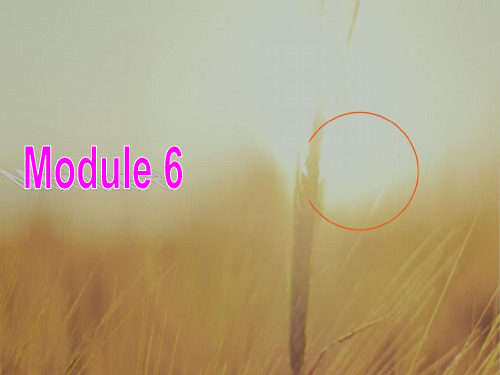
【注意】 may 暗含的可能性_较__小___,must 暗含 的可能性__较__大___。
5) must的简短回答: e.g. Must I clean the dining room at once? 我必须马上打扫餐厅吗? –Yes, you must. – No, you needn’t. – No, you don’t have to.
2) I think all poems should have rhymes. (e) This sentence expresses an opinion about what is right.
3) You should have asked my dad.
(a) This sentence refers to something which didn’t happen.
3) He was probably a very lonely man. He must have been a very lonely man.
4) One possibility is that he died from alcohol poisoning. He may/might have died from alcohol poisoning.
4) The two men must have been very good friends. (a) They might have been good friends. (b) They were probably very good friends. (c) It is certainly true that they were good friends.
英语周报2016-2017学年高二外研版选修八:Module 4 课件 Writing 精品
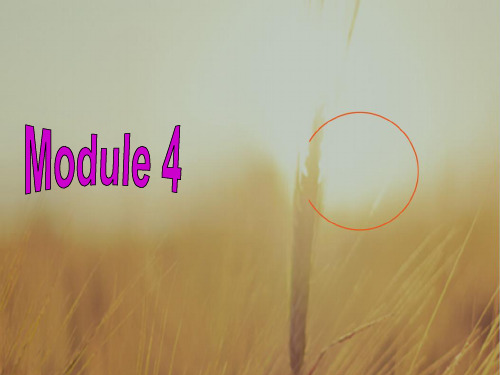
【参考范文】 Recently more and more network
buzzwords like “no zuo no die”, which are called Chinglish, have entered the Urban Dictionary. Different people have different opinions about it.
For
Against
3. Match the expressions with their meanings. 1. Firstly, … 2. Next, … 3. On the other hand… 4. In conclusion, … 5. Furthermore, … 6. Finally / Lastly …
Those who are for this think these network buzzwords enrich English. On the one hand, they are vivid and easy to understand and thus they are easier to learn.
【常用表达】 Recently more and more network buzzwords like ... have entered the Urban Dictionary. Different people have different opinions about ... Those who are for this think ... On the one hand, ... On the other hand, ... However, those who are against it think ... As far as I’m concerned, ...
英语周报2016-2017学年高二外研版选修七:Module 6 试
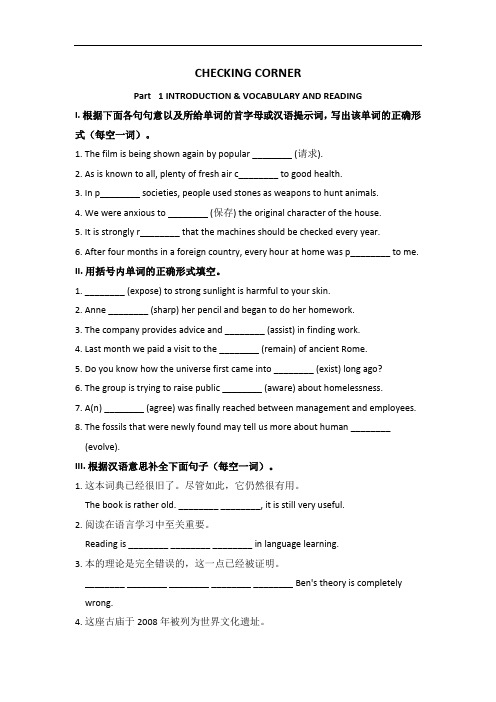
CHECKING CORNERPart 1 INTRODUCTION & VOCABULARY AND READINGI. 根据下面各句句意以及所给单词的首字母或汉语提示词,写出该单词的正确形式(每空一词)。
1. The film is being shown again by popular ________ (请求).2. As is known to all, plenty of fresh air c________ to good health.3. In p________ societies, people used stones as weapons to hunt animals.4. We were anxious to ________ (保存) the original character of the house.5. It is strongly r________ that the machines should be checked every year.6. After four months in a foreign country, every hour at home was p________ to me. II. 用括号内单词的正确形式填空。
1. ________ (expose) to strong sunlight is harmful to your skin.2. Anne ________ (sharp) her pencil and began to do her homework.3. The company provides advice and ________ (assist) in finding work.4. Last month we paid a visit to the ________ (remain) of ancient Rome.5. Do you know how the universe first came into ________ (exist) long ago?6. The group is trying to raise public ________ (aware) about homelessness.7. A(n) ________ (agree) was finally reached between management and employees.8. The fossils that were newly found may tell us more about human ________ (evolve).III. 根据汉语意思补全下面句子(每空一词)。
英语周报2016-2017学年高二外研版选修八:Module 5 试
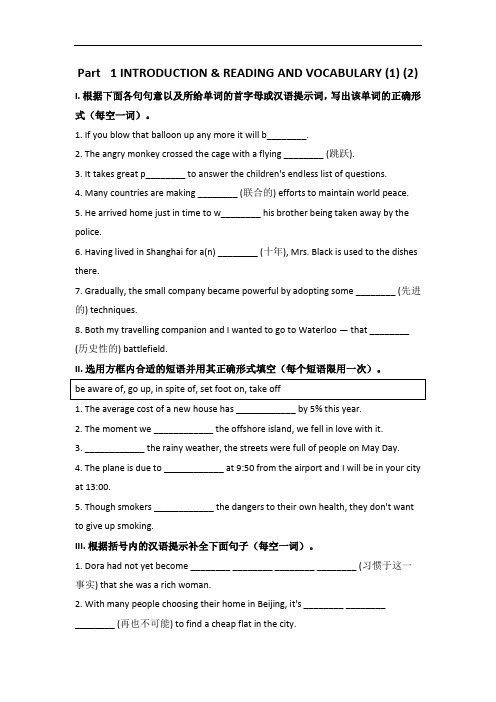
Part 1 INTRODUCTION & READING AND VOCABULARY (1) (2) I. 根据下面各句句意以及所给单词的首字母或汉语提示词,写出该单词的正确形式(每空一词)。
1. If you blow that balloon up any more it will b________.2. The angry monkey crossed the cage with a flying ________ (跳跃).3. It takes great p________ to answer the children's endless list of questions.4. Many countries are making ________ (联合的) efforts to maintain world peace.5. He arrived home just in time to w________ his brother being taken away by the police.6. Having lived in Shanghai for a(n) ________ (十年), Mrs. Black is used to the dishes there.7. Gradually, the small company became powerful by adopting some ________ (先进的) techniques.8. Both my travelling companion and I wanted to go to Waterloo — that ________ (历史性的) battlefield.II. 选用方框内合适的短语并用其正确形式填空(每个短语限用一次)。
1. The average cost of a new house has ____________ by 5% this year.2. The moment we ____________ the offshore island, we fell in love with it.3. ____________ the rainy weather, the streets were full of people on May Day.4. The plane is due to ____________ at 9:50 from the airport and I will be in your city at 13:00.5. Though smokers ____________ the dangers to their own health, they don't want to give up smoking.III. 根据括号内的汉语提示补全下面句子(每空一词)。
英语周报2016-2017学年高二外研版选修七:Module 6 试题 单元测试题 1 含答案 精品
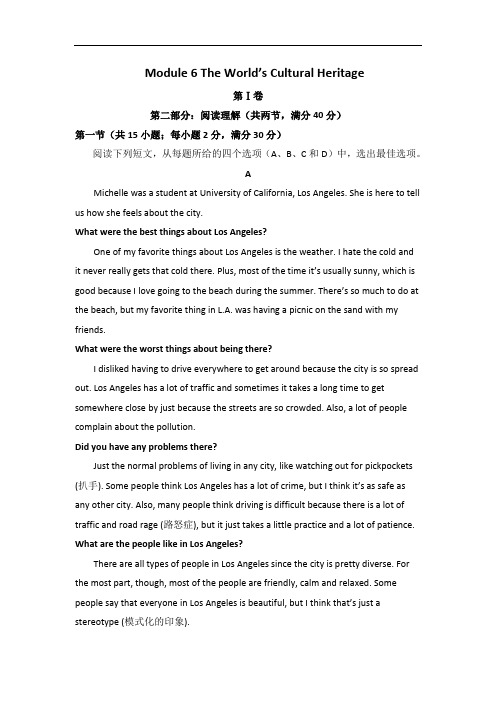
Module 6 The World’s Cultural Heritage第Ⅰ卷第二部分:阅读理解(共两节,满分40分)第一节(共15小题;每小题2分,满分30分)阅读下列短文,从每题所给的四个选项(A、B、C和D)中,选出最佳选项。
AMichelle was a student at University of California, Los Angeles. She is here to tell us how she feels about the city.What were the best things about Los Angeles?One of my favorite things about Los Angeles is the weather. I hate the cold and it never really gets that cold there. Plus, most of the time it’s usually sunny, which is good because I love going to the beach during the summer. There’s so much to do at the beach, but my favorite thing in L.A. was having a picnic on the sand with my friends.What were the worst things about being there?I disliked having to drive everywhere to get around because the city is so spread out. Los Angeles has a lot of traffic and sometimes it takes a long time to get somewhere close by just because the streets are so crowded. Also, a lot of people complain about the pollution.Did you have any problems there?Just the normal problems of living in any city, like watching out for pickpockets (扒手). Some people think Los Angeles has a lot of crime, but I think it’s as safe as any other city. Also, many people think driving is difficult because there is a lot of traffic and road rage (路怒症), but it just takes a little practice and a lot of patience. What are the people like in Los Angeles?There are all types of people in Los Angeles since the city is pretty diverse. For the most part, though, most of the people are friendly, calm and relaxed. Some people say that everyone in Los Angeles is beautiful, but I think that’s just a stereotype (模式化的印象).Would you go back to Los Angeles?Certainly. Los Angeles is one of my favorite cities in the world. I love the fact that it has all the nightlife and shopping of a big city, but also has access to beaches, parks, mountains and other places you can’t usually find in large cities. Between the weather and the beaches and all the fun things to do, it’s a great place to be.21. We can learn from the text that Michelle _____.A. hates the heavy traffic in Los AngelesB. dislikes the cold weather in Los AngelesC. thinks Los Angeles is small and crowdedD. enjoys driving everywhere in Los Angeles22. What’s Michelle’s impression o f the people in Los Angeles?A. They get angry easily.B. All sorts of people live there.C. They are patient and amusing.D. Everyone is kind and beautiful.23. How does Michelle find Los Angeles?A. Safe but noisy.B. Relaxing but busy.C. Polluted and dangerous.D. Diverse and interesting.24. We learn from the text that _____.A. Michelle was born in Los AngelesB. Michelle loved the life in Los AngelesC. Los Angeles has many traffic accidentsD. Michelle has no plan to return to Los AngelesBEvergreen Teen Book Club OfferThe Evergreen Teen Book Club invites you to join us and take full advantage of our limited-time introductory offer.If you join our club, you will receive a certificate for 3 free books. These are yours to keep, even if you decide to cancel your membership. However, if you decide to purchase just one book at the regular club price, you will receive a certificate for an additional 3 free selections after your first order is placed.As our member, you can benefit from all of our super sales and our Bonus Program. You accumulate 2 bonus points with each cash purchase of one book. Every 6 bonus points will earn you a certificate for one free book!To join our club, fill in the brief application listing your name, address, and phone number on the postage-paid card at the bottom of this page. Then drop the card in the mail and our present catalog will be immediately mailed out to you for your 3 free selections!This catalog offers a wide selection of over 500 books in every issue, including mysteries, adventures, biographies, cookbooks, sports, and many more. Our catalog also contains interviews with your favorite authors, reviews of newly published novels, and a teen top-ten list for both fiction and nonfiction.Once you are a member, you will receive our catalog monthly, but you don’t need to purchase any selections. We send you only exactly what you order.If you join before June 30th, we will also provide complimentary shipping (免费送货), even if you choose to order nothing except your 3 free books.You can build a great book collection!Begin now by taking advantage of this great offer.25. If you join the Evergreen Teen Book Club, you can _____.A. buy books at cost priceB. receive a gift after each orderC. expect 3 free books each monthD. get one free book for a cash purchase of 3 books26. If Lily wants to get free delivery, she should _____.A. join the club before June 30thB. accumulate 6 bonus pointsC. order at least 3 booksD. purchase the catalog27. The purpose of the text is to get more people to _____.A. collect books for the clubB. learn from famous writersC. read different kinds of booksD. join the club and order booksCDarek Fidyka, a 38-year-old Bulgarian, had been paralysed (瘫痪的) from the chest down for four years after a knife attack. Scientists from Britain and Poland took cells from his nose, transplanted (移植) them into his back and re-grew his spinal cord (脊髓). Now he can walk and even drive a car. The doctors were delighted but said it was the first step in a long journey.The breakthrough came after 40 years of research by Professor Geoff Raisman, who found that cells had the possibility to repair damage to nasal (鼻腔的) nerves, the only part of the nervous system that constantly (不断地) re-grows. “The idea was to take something from an area where the nervous system can repair itself, and does so throughout life, and put it into an area that doesn’t repair itself,” Professor Raisman said.Polish doctors injected the nasal cells into Mr Fidyka’s spinal cord above and below the injury and used some nerves from his ankle to form a bridge across the damaged tissue. The nasal cells appear to have caused the spinal nerves to repair themselves.Professor Raisman achieved this with rats in the late 1990s, but this is his greatest success. “I think the moment of discovery for me was Christmas in 1997 when I first saw a rat that couldn’t control its hand put its hand out to me. That was an exciting moment, because I realised then that my belief that the nervous system could be repaired was true.”Doctors chose the easiest case for their first attempt — it might not work for others. But there is a real sense of hope that an idea once thought impossible has been realised.David Nicholls, who helped provide money for the breakthrough, said information about the breakthrough would be made available to researchers across the globe.“What you’ve got to understand is that for t hree million paralysed people in the world today, the world looks a totally brighter place than it did yesterday,” he said.28. Why did Professor Geoff Raisman choose cells from the nose?A. The nervous system in the nose can repair itself.B. Cells in the nose can be easily transplanted.C. Cells in the nose re-produce rapidly.D. He just wanted to give it a try.29. Why did the operation work for Darek Fidyka?A. The nasal cells re-produced and spread quickly.B. The nerves from his ankle helped cure the injury.C. The nervous system in the spinal cord can repair itself.D. The nasal cells helped the spinal nerves to repair themselves.30. What made Professor Geoff Raisman believe the nervous system can be repaired?A. His study on animals.B. His operation on a paralysed patient.C. His sudden thoughts about Christmas.D. His unusual experience with a sick rat.31. David Nicholls’ words suggest that _____.A. the world is becoming better and brighterB. paralysed people have the hope of recoveryC. the report of the breakthrough will be published soonD. researchers across the globe will carry out the operationDThe Regional Director of the National Heritage Conservation Commission (国家遗产保护委员会) Kagosi Mwamulowe said the Barotse Plains is unique (独特的) and it deserves to be on the list of the World Heritage Sites.Mr. Mwamulowe said the Barotse Plains deserves to be included on the World Heritage List because it has a rich cultural heritage which includes the burial sites of former (以前的) kings.The Director said he hoped that the landscape would be declared as a heritage site next year in June. He also said it was important to protect Zambia’s unique culture for education and entertainment.Chief Natural Heritage Officer Muyumbwa Ndiyoi said there will be a lot of benefits when the Barotse Landscape is declared a World Heritage Site because it will attract many tourists and business investments will increase.Mr. Ndiyoi said the site will also benefit young people as knowledge will be passed down from generation to generation.He was reacting to a question from Nalolo District Labour Officer Jason Ngoma who wanted to know how the people of Western Province will benefit once the Barotse Landscape is declared a World Heritage Site.And University of Zambia Lecturer Charles Namate said there is a need for the site to be included on the World Heritage List because 50 years after its independence Zambia only has one heritage site, which is the Victoria Falls.Lecturer Namate said the Barotse Landscape was facing a lot of environmental degradation (恶化), and that’s why there is a need to recognize the value of its landscape and the memories of dead kings.The National Heritage Conservation Commission together with the Ministry of Chiefs and Traditional Affairs are in Western Province to hold meetings with Heads of Government Departments. The Commission also held closed-door meetings with the Litunga Lubosi Imwiko II of the Barotse Royal Establishment.32. What do we know about the Barotse Plains?A. It has royal tombs.B. It is being well protected.C. It is not far from the Victoria Falls.D. It’ll be listed as a World Heritage Site soon.33. Mr. Ndiyoi believes that if the Barotse Plains is declared a World Heritage Site,_____.A. it won’t benefit the people of Western ProvinceB. it will attract many foreign students and researchersC. it will contribute to the local economic developmentD. more people will start to learn about Zambia’s culture34. In the text, Lecturer Namate expressed his concern about _____.A. the future of the Barotse PlainsB. the development of Western ProvinceC. the development of tourism in ZambiaD. the environmental problems of the Barotse Plains35. What can we infer from the text?A. Zambia only has two World Heritage Sites.B. The Barotse Landscape has been partly destroyed.C. The Barotse Landscape issue is still being discussed.D. Young people in Zambia don’t know about Barotse culture.第二节(共5小题;每小题2分,满分10分)根据短文内容,从短文后的选项中选出能填入空白处的最佳选项。
英语周报2016-2017学年高二外研版选修七:Module 2 背
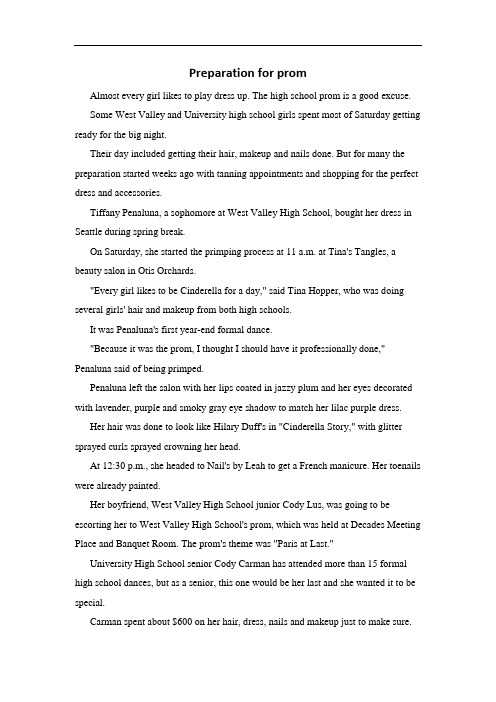
Preparation for promAlmost every girl likes to play dress up. The high school prom is a good excuse.Some West Valley and University high school girls spent most of Saturday getting ready for the big night.Their day included getting their hair, makeup and nails done. But for many the preparation started weeks ago with tanning appointments and shopping for the perfect dress and accessories.Tiffany Penaluna, a sophomore at West Valley High School, bought her dress in Seattle during spring break.On Saturday, she started the primping process at 11 a.m. at Tina's Tangles, a beauty salon in Otis Orchards."Every girl likes to be Cinderella for a day," said Tina Hopper, who was doing several girls' hair and makeup from both high schools.It was Penaluna's first year-end formal dance."Because it was the prom, I thought I should have it professionally done," Penaluna said of being primped.Penaluna left the salon with her lips coated in jazzy plum and her eyes decorated with lavender, purple and smoky gray eye shadow to match her lilac purple dress.Her hair was done to look like Hilary Duff's in "Cinderella Story," with glitter sprayed curls sprayed crowning her head.At 12:30 p.m., she headed to Nail's by Leah to get a French manicure. Her toenails were already painted.Her boyfriend, West Valley High School junior Cody Lus, was going to be escorting her to West Valley High School's prom, which was held at Decades Meeting Place and Banquet Room. The prom's theme was "Paris at Last."University High School senior Cody Carman has attended more than 15 formal high school dances, but as a senior, this one would be her last and she wanted it to be special.Carman spent about $600 on her hair, dress, nails and makeup just to make sure.She arrived at Tina's Tangles Saturday already tanned. Her nails and toes had been painted.She was at the salon with her best friend, Christina Fridye, to get their hair and makeup done.Carman wanted something dramatic. She left with her lips lined in dark chocolate. Her eye shadow and lipstick were ice pink."It's the last time we will all be dressed up together, so I got out with a bang," she said.Her date spent more than most boys on his prom preparation. Casey Ingraham painted a cane to match his white tuxedo with silver vest."It took like an hour and a half to get ready," he said. "That's more than the usual getting-ready time."The University High School's prom, which was themed "New York, New York," was held at the Globe Room in Cataldo at Gonzaga University.Primping was something that most boys attending the two proms barely thought about. Their ideas of preparation, if any, meant picking up a tuxedo and showering. Chris Shields, a West Valley student attending the prom, said just going to get a tux and taking a shower made Saturday a busy day for him."I wasn't planning to get up until 2 p.m.," he said.Shane Rektor, another West Valley teen, slept in until 11:30 a.m. then took a shower and "put on what I would normally wear."However, he did add a pink tie to his black pants and dress shirt to match the dress of his date, Natalie Brown.Brown, a West Valley High School senior, said she had to tie his tie for him though.Brown had also spent the day primping for the prom. Her hair was done in an up do with large ringlets and pink roses."I look fabulous," she said.。
英语周报2016-2017学年高二外研版选修七:Module 1 Ba

后缀后缀是一种重要的构词法,课本P137-P138介绍了形容词后缀-ful, -less, -ic, -al, -ive, -ous等的用法。
下面我们通过例句介绍其他几种常见后缀的用法。
【语境展示】阅读下面句子,注意画线单词的后缀,并加以总结。
1. a. Bob's too selfish to think of lending me his car.b. Ann wore a richly coloured silk dress.c. The dancer's movements were slow and dreamlike.d. Parents may find that a troublesome teenager has become unmanageable.2. a. Sam is good at cake decoration.b. According to observers, the plane exploded shortly after take-off.c. The theme park is attracting more visitors than ever.d. The number of employees in the company has doubled over the past years.e. A waitress arrived with the wine they had ordered.f. There's not much difference in price between the two computers.g. The government is encouraging the development of small businesses.h. There is an extra hour of darkness on winter mornings.3. a. Injury problems could shorten his career.b. He tried to simplify the story for the younger audience.c. The Beatles popularized British rock in the early 1960s.4. a. Little Jack was in tears and obviously very upset.b. Most of these people are paid monthly.c. I walked backward(s) down the stairs, carrying the heavy box.【归纳】通过观察第1组句子,我们可将形容词后缀归纳如下:★-ish表示“……似的”,加在名词后可使其变为形容词(句a);★-ed表示“有……的”,加在名词后可使其变为形容词(句b);★-like表示“类似……的”,加在名词后可使其变为形容词(句c);★-some表示“引起(或易于)……的”,加在名词后可使其变为形容词(句d)。
英语周报2016-2017学年高二外研版选修八:Module 1 试题 单元测试题 2 含答案 精品
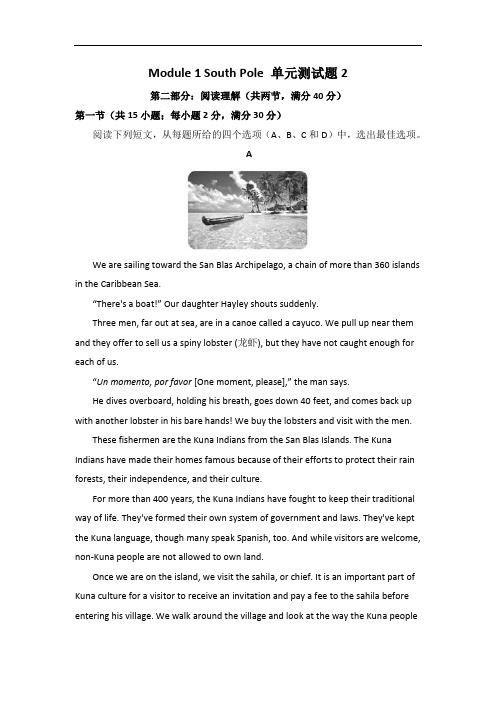
Module 1 South Pole 单元测试题2第二部分:阅读理解(共两节,满分40分)第一节(共15小题;每小题2分,满分30分)阅读下列短文,从每题所给的四个选项(A、B、C和D)中,选出最佳选项。
AWe are sailing toward the San Blas Archipelago, a chain of more than 360 islands in the Caribbean Sea.“There's a boat!” Our daughter Hayley shouts suddenly.Three men, far out at sea, are in a canoe called a cayuco. We pull up near them and they offer to sell us a spiny lobster (龙虾), but they have not caught enough for each of us.“Un momento, por favor [One moment, please],” the man says.He dives overboard, holding his breath, goes down 40 feet, and comes back up with another lobster in his bare hands! We buy the lobsters and visit with the men.These fishermen are the Kuna Indians from the San Blas Islands. The Kuna Indians have made their homes famous because of their efforts to protect their rain forests, their independence, and their culture.For more than 400 years, the Kuna Indians have fought to keep their traditional way of life. They've formed their own system of government and laws. They've kept the Kuna language, though many speak Spanish, too. And while visitors are welcome, non-Kuna people are not allowed to own land.Once we are on the island, we visit the sahila, or chief. It is an important part of Kuna culture for a visitor to receive an invitation and pay a fee to the sahila before entering his village. We walk around the village and look at the way the Kuna peoplelive. Kuna villages vary in size. They can range from a few dwellings (住所) to large villages with some modern conveniences.Hayley and her brother Jackson are being homeschooled while we are traveling on our boat. Part of our homeschool day is spent learning about the countries and people we visit. Earlier today we read about Kuna foods and money. The Kuna eat a lot of fish, lobsters and coconuts (椰子). The coconut is also used for money. Each coconut tree has a Kuna owner, so the coconuts cannot be taken or touched.21. According to the text, the Kuna Indians have been trying their best to _____.A. expand their landB. prevent strangers visitingC. keep their traditions aliveD. learn more about the outside world22. Why does the author's family visit the sahila?A. To ask for his help.B. To show respect for him.C. To invite him to travel with them.D. To get permission to enter his village.23. The main purpose of this text is to introduce _____.A. the meaning of travelingB. the benefits of homeschoolingC. the history of the San Blas IslandsD. the native people living on the San Blas IslandsBOne of the most significant parts of my high school career would be playing in the orchestra. I remember when I first started playing the viola (中提琴) in my school's program as an inexperienced fourth grader. As my interest in music grew, I decided to find a private instructor.During my first lesson, I was surprised at what Dr. T was teaching — how to hold the viola and play open strings! To me, these were basic concepts I had long ago mastered. However, the following week, what I thought I had learned wascompletely disproven. With such high expectations, Dr. T criticized many aspects of my posture, intonation and bowing (音准和弓法). But as I became more familiar with my viola, Dr. T started assigning(分配) me actual compositions. Meanwhile, I became more and more interested in our school's ensemble (合奏组).I first decided to become a section leader in middle school, when we were given the opportunity to try out for our ensemble's first and second chairs. During the first class, our conductor, Mrs. V, introduced us to a section leader's responsibilities. These duties included helping others with the concert music and setting a good example. After discussion, I decided to try out and started preparing the assigned piece. Every day, I would practice for at least 45 minutes. Needless to say, this was easier said than done. It required a lot of concentration and will power. Regardless, by the end of the week, I had become more familiar with the music.To my surprise, the audition (试听) process was more pleasant than I had imagined. As I unpacked my viola, I started to doubt my decision. However, when I entered Mrs. V's homely office, I felt more relaxed. By the end of my audition, Mrs. V said that I had a good chance of becoming the principal violist! The next day, during orchestra, I learned that indeed, I had become our section's first chair.24. Before the author studied under Dr. T, she _____.A. had never played the violaB. had expressed interest in musicC. had written some compositionsD. had been a promising young artist25. The underlined word “disproven” in Paragraph 2 can be replaced by “_____”.A. lazyB. wrongC. foolishD. surprised26. Which of the following can best describe the author?A. Unusual and scholarly.B. Self-centered and proud.C. Independent and optimistic.D. Hard-working and determined.27. When attending the audition, the author _____.A. felt confident of succeedingB. received some careers guidanceC. left a good impression on Mrs. VD. remembered her first viola instructorCJapanese fans who watched their national team be defeated(打败) by the Ivory Coast on Saturday showed it is possible to lose graciously, when they stayed behind after the match to help clean up.Despite seeing Japan's Blue Samurais lose 2-1 against the Ivory Coast's national team at the Arena Pernambuco in Recife, the Japanese audience armed with plastic bags searched their side of the stadium and gathered up dropped litter. While gathering waste after a sporting event is customary in Japan, the audience's actions came as a shock to football fans from other countries.This isn't the first time the Japanese have taken trash outside the stadium. The 1998 FIFA World Cup held in France was the first ever World Cup that Japan had qualified for. After their first group game against Argentina, the Japanese fans gave the world a lesson in politeness and respect by actually cleaning the football stadium seats. They picked up all the trash around them whether it was theirs or not. They then walked out and threw the trash in the garbage cans before leaving.The all-around cleanliness of Japanese large cities comes as a culture shock to people coming from other big cities in the world. This tidiness is not due to millions of dollars spent on street cleaners and “Let's cle an-up our city” campaigns. It's not due to effective public works or community service. It's due to one simple thing:They don't throw their rubbish on the floor. This unique and rare concept allows for both huge cities and the countryside to stay neat and tidy.To reinforce (加强) this behavior, the common signs in Japan ask people to take their litter home with them. Then, to reinforce the sign, they usually have no garbage cans in the parks. So when faced with the choice of throwing their garbage on the ground or keeping it with them, they keep it. They don't need a “Don't Litter” or “Keep Japan Beautiful” sign. They have been doing it their whole lives and are used to taking their garbage with them.28. The story in Paragraph 3 mainly shows that _____.A. Japanese people are used to carrying their own trashB. Japanese fans have a habit of cleaning up the stadiumC. Japanese fans often clean stadium seats before the gameD. the Japanese are very interested in watching football games29. What can we say about Japanese big cities' cleanliness?A. It has become common practice.B. It is the result of community service.C. It costs millions of dollars every year.D. It exists because of public campaigns.30. Which of the following do the Japanese accept as normal?A. Punishing the behavior of littering.B. Many signs reading “Don't Litter”.C. Lots of garbage cans in the parks.D. Taking litter away with them.31. The author's attitude to the Japanese audience might be that of _____.A. criticismB. unconcernC. respectD. doubtDWhere can you find the first successful airplane, one of the world's biggest bugs (虫子) and Kermit the Frog? They're all at the Smithsonian Institution, American'sstorehouse of the coolest things ever, in Washington, D.C. More than 138 million objects have been collected by their 19 museums, with more coming in every day.The Smithsonian was founded in 1846 and named after James Smithson, an English businessman. Smithson never visited America, but he left his entire fortune to the United States to build an institution “for the increase of knowledge.”Here are just a few of the amazing things in the Smithsonian collection.Big bugsThe Smithsonian has 35 million bugs. The largest insect in the collection is a beetle (甲虫) from South America called the titan beetle. Titan beetles can grow to more than 6 inches long.Flying machinesThe first powered plane to fly, the 1903 Wright Flyer, is displayed in the National Air and Space Museum. The Smithsonian has the first supersonic (超音速的) airliner, the Concorde, which could cross the Atlantic Ocean in fewer than four hours.The longest beardThe Smithsonian is home to the longest beard ever recorded. Norwegian immigrant Hans Langseth had grown his facial hair to 18 feet 6 inches by the time he died in 1927. The Smithsonian has 17 feet 6 inches of it because, even though Langseth's final wish was to have his entire beard preserved, his family decided it wouldn't be right to bury him clean-shaven.Time and admission(入场费):Smithsonian museums are open every day of the year except December 25 unless otherwise noted. Most museums are open daily from 10 a.m. to 5:30 p.m. The American Art Museum and Portrait Gallery are open 11:30 a.m. to 7 p.m Admission is free for all Smithsonian museums and the zoo in Washington, D.C., and the American Indian Museum's George Gustav Heye Center in New York. A fee is required at the Cooper-Hewitt, National Design Museum in New York (Members and children under 12 are admitted free).32. According to the text, the Smithsonian Institution _____.A. was founded in honor of an AmericanB. has all its museums in Washington, D.C.C. is most famous for its fine collection of artD. was funded by money from James Smithson33. The Smithsonian failed to get the entire beard of Hans Langseth's due to _____.A. the words in his last willB. the rejection of his familyC. the tradition of NorwegiansD. the bad condition of the beard34. What do the objects mentioned have in common?A. They were from South Africa.B. They are in the same museum.C. They are record-breaking items.D. They were from the 19th century.35. All of Smithsonian museums _____.A. are open at 10 a.m.B. charge an entrance feeC. are closed on Christmas DayD. ask for your membership cards第二节(共5小题;每小题2分,满分10分)根据短文内容,从短文后的选项中选出能填入空白处的最佳选项。
英语周报2016-2017学年高二外研版选修七:Module 2 教
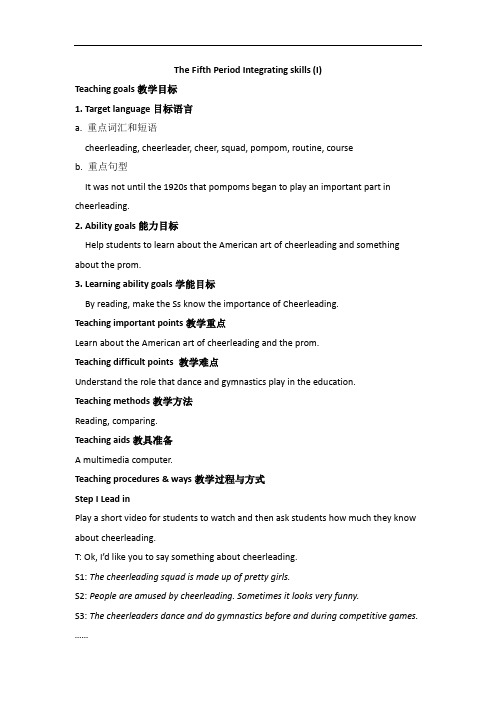
The Fifth Period Integrating skills (I)Teaching goals教学目标1. Target language目标语言a. 重点词汇和短语cheerleading, cheerleader, cheer, squad, pompom, routine, courseb. 重点句型It was not until the 1920s that pompoms began to play an important part in cheerleading.2. Ability goals能力目标Help students to learn about the American art of cheerleading and something about the prom.3. Learning ability goals学能目标By reading, make the Ss know the importance of Cheerleading.Teaching important points教学重点Learn about the American art of cheerleading and the prom.Teaching difficult points 教学难点Understand the role that dance and gymnastics play in the education.Teaching methods教学方法Reading, comparing.Teaching aids教具准备A multimedia computer.Teaching procedures & ways教学过程与方式Step I Lead inPlay a short video for students to watch and then ask students how much they know about cheerleading.T: Ok, I’d like you to say something about cheerleading.S1: The cheerleading squad is made up of pretty girls.S2: People are amused by cheerleading. Sometimes it looks very funny.S3: The cheerleaders dance and do gymnastics before and during competitive games. ……Step II Cultural cornerT: Now let’s read the article on Page 27. From it you will learn more about the American art of cheering leading. After you read the passage please answer the questions on Page 27.Five minutes later, check the answers with the whole class.Suggested answers:1.Yes, it is. Universities offer courses in cheerleading. A lot of training is needed todo the dance and gym routine. Cheerleading competitions are an important part in school and college life for many squads, and cheerleading is a very serious activity. Cheerleading squads can be found at most athletic events.2.Our school does offer dance and gymnastics courses, but they don’t play animportant part in our education.Step III Reading (Workbook)Deal with Reading on Page 99.T: Do you remember what is Joanna’s highlight of the senior year?Ss: The senior prom.T: What is a “prom”? Ok, you can get the answer from the passage on Page 99. Read the textquickly and match the headings with the paragraphs.After checking the answers, ask students to read the passage again and do Ex 7&8 on Page 100.Suggested answers:7.1. “Prom” comes from the verb” to promenade”, which means “to walk around,beautifully dressed, in order to attract attention”.7.2. It marks the end of life as a child, and the beginning of life as an adult.7.3. In Canada, the event is called a “formal”. In Britain and Australia, the oldfashioned word “dance” is more and more frequently being referred to as a“prom”, and for final school year students in all these countries, this event is the highlight of the school year, just as it is in the USA.7.4. Some students sell the student newspapers to raise money and taking apart-time job at the weekend is another way.7.5. There is the problem of what to wear, who to take as the partner, who will bevoted “prom queen”, etc.7.6. What many parents find difficult is the realization that their children’s schooldaysare almost over.7.7. Yes, I’d like to. At a “prom” I would have lots of fun. I think it is a great event tomark my schooldays are over.Step IV Speaking and writingDeal with Ex 13-16 on Page 102.Ask students to work in pairs. Several minutes later, ask some pairs to act them out. Sample of the conversation in Ex 13:A: Hello, B. How are you doing these days?B: I have just returned from summer camp.A: Really?B: Yes, I had a wonderful time there. I also learnt some new skills.A: My parents want to send me to camp, but I don’t want to go. My friends are all staying at home. I don’t know anybody there.B: Don’t worry. You will meet new people and make new friends there. I made so many new friends there.A: I’m quiet and I don’t make friends easily.B: I think it is much more fun than staying at home and being bored. I tried lots of different things for the first time.A: I am not very good at sports. I’m afraid of horses. I don’t like swimming or water sports.B: There’s a lot of choice—I don’t have to do anything I don’t want to do at the camp. A: I haven’t been away from home for long before.B: It makes you feel more independent and “grown up” to be away from home.A: OK, I will have a try.B: Good luck to you and have a good time.A: Thanks.Sample of a letter (Ex 14):Dear mum and dad,How are you? I’m having a good time here. Please don’t worry about me.At first I felt lonely and missed you very much because I didn’t know anybody. Now I’ve made some new friends here. They are very active and lovely. I tried lots of different things for the first time. Can you believe it? I can ride a horse. You know I was afraid of horses very much. I also learnt some new skills. There’re a lot of choices here—I don’t want to do anything I don’t want to do. I’m having a lot of fun here. I feel more independent and “grown up” to be away from home.I am sure you will feel very proud of me.Take care!HelenSample of the discussion (Ex 15):A: I would like to have a prom. At the prom we would have a lot of fun. It is also a great event that marks the end of life as a child, and the beginning of life as an adult.B: I agree, but I think cheerleading is more enjoyable. As know you, only few girls are accepted. to be a cheerleader is to play a very important part in your school.A: But I find studying for the diploma more enjoyable.B: I think the development of social skills is very important. So I enjoy after-school clubs.A: I don’t like sports training. I like the student newspaper.B: It is important to learn to compete successfully. So school sport is more important than academic achievements.Sample of a short article (Ex 16):Differences between life as an American senior high studentand a student in ChinaThe senior high school life in China is not as rich as that in America. Students in China get to study hard everyday, and they have to remember all the things in class. Everyday they have to stay at school for all day; they get off the school at 9:30 P.M..Being a high school student in China isn’t easy. Teachers and parents are always warning them of the exams. They warn students about college. They tell them that it isn’t going to be easy to pass the college entrance exams. They tell students that it is going to be a big challenge. Only those top students can be admitted to college.The school curriculum is harder. Most students and their parents think academic achievements are more important.In the US the senior high school year is really hectic with filling out applications and preparing for college.School runs from 8 am to 3 pm. They don’t have to devote all the time to studying for the college entrance exams. Out of school other than homework students have a lot of fun. Schools offer a large number of clubs and different after-class activities. For them social skills are more important than academic achievements.Step V HomeworkWrite Ex 16 on Page 102 in their exercise-books.Go over the different clubs at American schools.List the highlights of your school year.。
英语周报2016-2017学年高二外研版选修七:Module 2 教
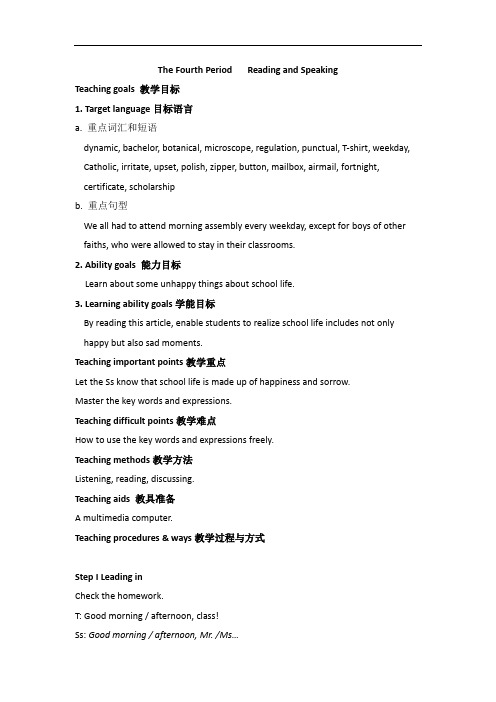
The Fourth Period Reading and SpeakingTeaching goals 教学目标1. Target language目标语言a. 重点词汇和短语dynamic, bachelor, botanical, microscope, regulation, punctual, T-shirt, weekday, Catholic, irritate, upset, polish, zipper, button, mailbox, airmail, fortnight, certificate, scholarshipb. 重点句型We all had to attend morning assembly every weekday, except for boys of other faiths, who were allowed to stay in their classrooms.2. Ability goals 能力目标Learn about some unhappy things about school life.3. Learning ability goals学能目标By reading this article, enable students to realize school life includes not only happy but also sad moments.Teaching important points教学重点Let the Ss know that school life is made up of happiness and sorrow.Master the key words and expressions.Teaching difficult points教学难点How to use the key words and expressions freely.Teaching methods教学方法Listening, reading, discussing.Teaching aids 教具准备A multimedia computer.Teaching procedures & ways教学过程与方式Step I Leading inCheck the homework.T: Good morning / afternoon, class!Ss: Good morning / afternoon, Mr. /Ms…T: What have been talked about in this unit up now?Ss: Happy hours in high school life.T: Today we are going to read another article abut school life. Please read it quickly and decide whether the writer’s schooldays were happy or sad.Step II ReadingDeal with the reading part on Page 25.ScanningAsk the students to scan the text and decide whether the writer’s schooldays were happy or sad and find some examples.Three minutes later, ask students to compare their information with their group members. Then check the answer with the whole class. It is quite easy for students to find the writer’s schooldays were sad. There are many examples in the text describing his unhappy memories.Careful readingAsk students to read the text carefully and then answer the questions in Ex 5-6 on Page 26.T:Please read the text carefully and then do Ex 5-6 on Page 26. Five minutes later we will check the answers.Possible answers to Ex 6:6.1. The writer’s memory of his first day at school is that he was lonely and sad.6.2. His English teacher spent more time with the boys because he was a bachelorwho had plenty of free time.6.3. He checked his mailbox every day because he was looking forward to hismummy’s airmail letter.6.4. We know the school assembly was a religious event because boys of other faiths,for example, a Catholic, were allowed to stay in their classrooms.6.5. He felt a sense of liberation when he left because he didn’t like the school. Hethought the school rules were silly.DiscussionAsk students to work in groups and compare their first day at school with that of thewriter. Write sentences describing what was similar and what was different. Five minutes later, exchange their information with other groups. Then they will be asked to write some suggestions on how to make school days more enjoyable.T: OK, some of you have happy memories while some students are not so lucky. Now please work together and make suggestions on how to make your schooldays more enjoyable.Suggested answers to Ex 7:My first day at schoolMy parents sent me to the school. They carried my suitcase to my dormitory where I would sleep with five other girls/boys. The bedding was the same except for the number. I was very excited because everything was new and different from home. I was very happy.Some suggestions on how to make school days more enjoyableI think our school should have more after-school activities so that we students will be kept busy outside class. We should have more sports clubs so that we can learn some social skills, for example, competing skills or competing spirit.In my opinion, we should be given less homework to do.I suggest we should have a music club. We will learn music and talk about music. We can also organize concerts.I think it a good idea to have a drama club in our school. The school play will make our life colorful.Step III SpeakingAsk students to work in groups and talk about American high school life. Discuss what they have learnt about American high school life and what they like or dislike about American high school life. Decide aspects of American high school life that are unusual to them.Possible answers to Ex 1 on Page 24 in SPEAKING:1.1.I have learned something about the American Secondary School System. MiddleSchool is from Grade 6 to Grade 8. Senior High School is from Grade 9 to Grade12.Sports are an important part of American high school life.The senior prom is so important in their high school life that both students and their parents value it very much. Some students begin to prepare for it from the beginning of their high school.They have so many senior high clubs. They have a large number of after-school activities. They may have a lot of fun at school.They think it very important to develop social skills.Older teenagers take summer jobs to make money.1.2. I think it is good to spend some time on sports, while I don’t think sports aremore important than academic achievements.How I wish we could have a senior prom. But I don’t want to spend much time or money on it.It is good that the development of social skills is considered as important as the development of intellectual skills. What we learn in school should prepare us for what we are going to do in society.Sample discussion of Ex 2 on Page 24:S1: I think the senior prom is very good. It is the turning point of teenagers.S2: I like the fact that the senior prom is a very important event in their high school life. But it worries me that they spend so much time and money on it.S3: I think it is a very good tradition. Maybe we can bring in this custom. After the exams are finished, we may have such a prom to mark that our high school days are over and we’ll walk out of the school gates forever. Whenever we look back at our high school days, we will think about the wonderful things besides our academic achievements.S4: It seems strange to me that American high schools have so many different clubs, which make schools similar to the real adult world. That’s why American high school students have very better social skills than the Chinese peers.S5: It worries me that schools offer a large number of after-school activities, which take place outside classroom lessons. How can American high school students find enough time to do their lessons?S6: I like after-school activities very much. By taking part in these activities, students show their special talents, their ability to lead, and their ability to get on with others.S7: I admire American children very much because they usually spend several weeks at summer camps. I think it a good idea that older teenagers get summer jobs and make money. I don’t think it a good idea that we have to do our lessons during the long summer holidays.Step IV WritingAfter the discussion of the American high school life, ask students to imagine their ideal senior high school life. After talking about the ideal senior high school life, students will be required to write an article for a student newspaper to describe it. They should refer to the directions on Page 24.Step V HomeworkFinish the Writing on Page 24。
英语周报2016-2017学年高二外研版选修七:Module 3 辅
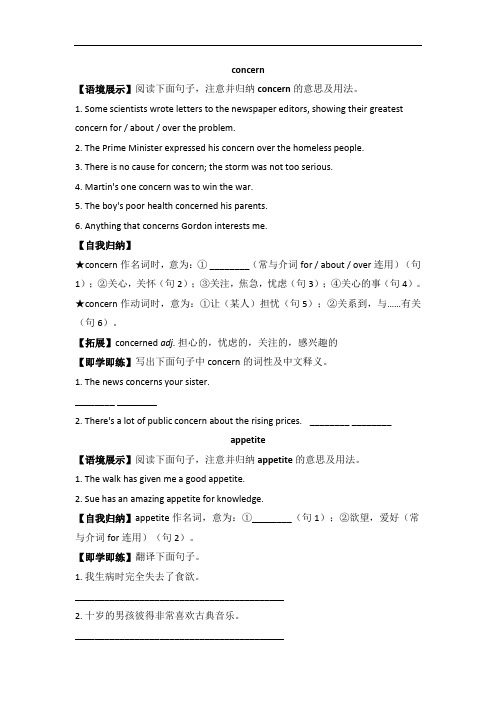
concern【语境展示】阅读下面句子,注意并归纳concern的意思及用法。
1. Some scientists wrote letters to the newspaper editors, showing their greatest concern for / about / over the problem.2. The Prime Minister expressed his concern over the homeless people.3. There is no cause for concern; the storm was not too serious.4. Martin's one concern was to win the war.5. The boy's poor health concerned his parents.6. Anything that concerns Gordon interests me.【自我归纳】★concern作名词时,意为:① ________(常与介词for / about / over连用)(句1);②关心,关怀(句2);③关注,焦急,忧虑(句3);④关心的事(句4)。
★concern作动词时,意为:①让(某人)担忧(句5);②关系到,与……有关(句6)。
【拓展】concerned adj. 担心的,忧虑的,关注的,感兴趣的【即学即练】写出下面句子中concern的词性及中文释义。
1. The news concerns your sister.________ ________2. There's a lot of public concern about the rising prices. ________ ________appetite【语境展示】阅读下面句子,注意并归纳appetite的意思及用法。
英语周报2016-2017学年高二外研版选修七:Module 2 试
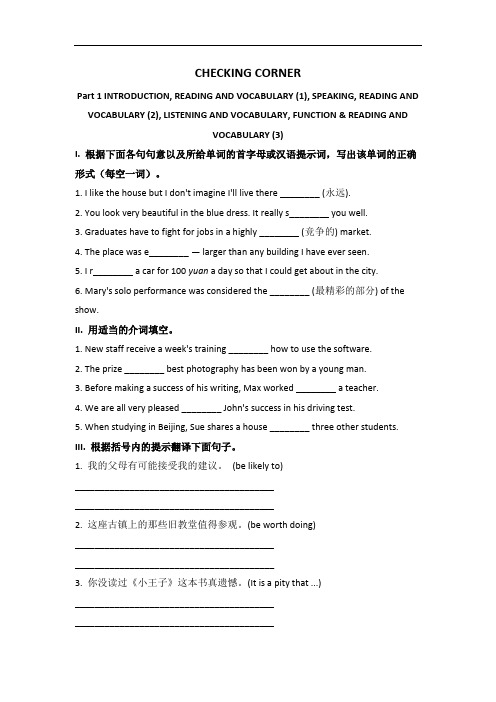
CHECKING CORNERPart 1 INTRODUCTION, READING AND VOCABULARY (1), SPEAKING, READING AND VOCABULARY (2), LISTENING AND VOCABULARY, FUNCTION & READING ANDVOCABULARY (3)I. 根据下面各句句意以及所给单词的首字母或汉语提示词,写出该单词的正确形式(每空一词)。
1. I like the house but I don't imagine I'll live there ________ (永远).2. You look very beautiful in the blue dress. It really s________ you well.3. Graduates have to fight for jobs in a highly ________ (竞争的) market.4. The place was e________ — larger than any building I have ever seen.5. I r________ a car for 100 yuan a day so that I could get about in the city.6. Mary's solo performance was considered the ________ (最精彩的部分) of the show.II. 用适当的介词填空。
1. New staff receive a week's training ________ how to use the software.2. The prize ________ best photography has been won by a young man.3. Before making a success of his writing, Max worked ________ a teacher.4. We are all very pleased ________ John's success in his driving test.5. When studying in Beijing, Sue shares a house ________ three other students. III. 根据括号内的提示翻译下面句子。
英语周报2016-2017学年高二外研版选修八:Module 6 教

附件Ⅰ. 课文注释与疑难解析1. Persians, Arabs and Jews came to live in Chinese towns, bringing with them their own religions and customs.波斯人、阿拉伯人和犹太人带着自己的宗教和风俗来中国的城镇居住。
句中bringing with them ... 是现在分词短语做伴随情况状语。
用何种分词在句子中作状语,取决于分词与句子主语的逻辑关系:主谓关系用现在分词,动宾或被动关系用过去分词。
Not shavings enough hands, we turned to them for help.Although working very hard, he failed to pass the final exam.2. They were allowed to live in communities governed by their own laws, and to keep their traditional forms of entertainment such as music and dance, which influenced the development of Tang culture.他们都被获准生活在由自己的法律管辖的社区内,他们还可以保留自己传统的诸如音乐和舞蹈等娱乐方式,这些都对唐文化的发展有一定的影响。
句中governed by their own laws是过去分词短语作定语。
To live in ...与to keep ...是两个并列的动词不定式,作allowed的宾语。
3. It is said that he drowned when he fell into a river while trying to take hold of the reflection of the moon.据说他在设法抓住河里月亮的倒影时掉进河里溺死了。
英语周报2016-2017学年高二外研版选修七:Module 3 辅
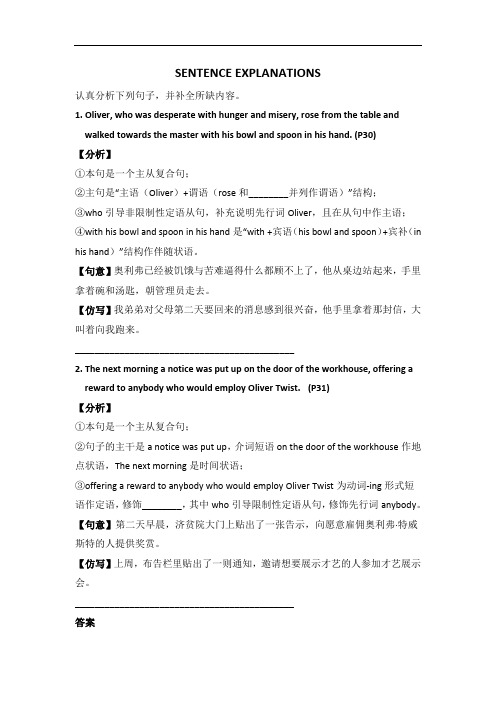
SENTENCE EXPLANATIONS认真分析下列句子,并补全所缺内容。
1. Oliver, who was desperate with hunger and misery, rose from the table and walked towards the master with his bowl and spoon in his hand. (P30)【分析】①本句是一个主从复合句;②主句是“主语(Oliver)+谓语(rose和________并列作谓语)”结构;③who引导非限制性定语从句,补充说明先行词Oliver,且在从句中作主语;④with his bowl and spoon in his hand是“with +宾语(his bowl and spoon)+宾补(in his hand)”结构作伴随状语。
【句意】奥利弗已经被饥饿与苦难逼得什么都顾不上了,他从桌边站起来,手里拿着碗和汤匙,朝管理员走去。
【仿写】我弟弟对父母第二天要回来的消息感到很兴奋,他手里拿着那封信,大叫着向我跑来。
____________________________________________2. The next morning a notice was put up on the door of the workhouse, offering a reward to anybody who would employ Oliver Twist. (P31)【分析】①本句是一个主从复合句;②句子的主干是a notice was put up,介词短语on the door of the workhouse作地点状语,The next morning是时间状语;③offering a reward to anybody who would employ Oliver Twist为动词-ing形式短语作定语,修饰________,其中who引导限制性定语从句,修饰先行词anybody。
英语周报2016-2017学年高二外研版选修八:Module 3 教
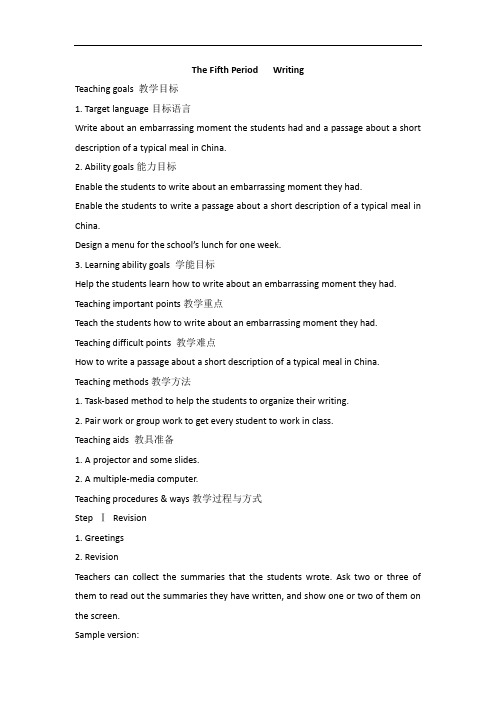
The Fifth Period WritingTeaching goals 教学目标1. Target language目标语言Write about an embarrassing moment the students had and a passage about a short description of a typical meal in China.2. Ability goals能力目标Enable the students to write about an embarrassing moment they had.Enable the students to write a passage about a short description of a typical meal in China.Design a menu for the school’s lunch for one week.3. Learning ability goals 学能目标Help the students learn how to write about an embarrassing moment they had. Teaching important points教学重点Teach the students how to write about an embarrassing moment they had. Teaching difficult points 教学难点How to write a passage about a short description of a typical meal in China. Teaching methods教学方法1. Task-based method to help the students to organize their writing.2. Pair work or group work to get every student to work in class.Teaching aids 教具准备1. A projector and some slides.2. A multiple-media computer.Teaching procedures & ways教学过程与方式Step ⅠRevision1. Greetings2. RevisionTeachers can collect the summaries that the students wrote. Ask two or three of them to read out the summaries they have written, and show one or two of them on the screen.Sample version:One of the best-known designs on British plates is the “Willow Pattern”. Normally this kind of plates is kept only for important occasions when important guests come to dinner. The Willow Pattern Plate was based on Chinese designs, which is a mixture of different elements from Chinese designs. The first plates of this kind included a bridge with three people crossing it, a boat, a teahouse, a fence in the foreground and two songbirds flying overhead.Behind the scene pictured on the plate is a very touching love story. Once there was a girl named Kun Xi, who was the daughter of a rich Mandarin. She fell in love with his father’s gardener. Despite her father’s strong objection, she still loved him deeply. At last the two escaped to an island. But the Mandarin and his servants followed there, and set fire to the hut where they stayed. The two of them were killed in the fire, but their souls were transformed into songbirds, which you can see singing at the top of the picture.Step ⅡWriting (Page 38)Activity 1 Complete the sentences about the story on Page 35.Get the students to go over the story on Page 35. Make sure the students know how to write a coherent and fluent passage. Ask them to think it over, have a discussion in pairs and then ask two or three students to report their answers.Suggested answers:1) One evening the King of England was entertaining the ruler of a small island in the Pacific.2) As soon as the Polynesian guest tasted the asparagus he remarked how delicious it was.3) When the King found the Polynesia throw the hard part over his shoulder onto the floor, he said nothing.4) Before long everybody else at the dinner was following his example.5) At the end of the meal, the carpet was rather dirty.6) In the end most people had to agree the king had been a perfect host, saving his guest and everybody else from the embarrassment.Activity 2 Complete the sentences with at the end or in the end.Get the students to master the usage of the two phrases. Explain the difference between the two phrases. Then ask them to do it by themselves and then check the answers.T: Pay attention to the two phrases. Who can tell me the difference between “at the end” and “in the end”?S: “At the end”means “finished”, and it can be followed by “of”phrase. “in the end”means “finally”or “at last”and it can’t be followed by “of”phrase. T: Good! Now do the activity by yourselves, and then let’s check the answers. Activity 3 Write about an embarrassing moment you (or someone you know) had. First ask the students to think about an embarrassing moment, then tell them the steps to write a good passage. Second, get them to discuss it in pairs and tell them to do the writing by themselves. Third, collect the passages the students have written. At last, show them on the screen and make proper comments.T: Since we have read the story on Page 35. Who can tell me what needs to be done to write a good passage?S: First we should make sure what to write about. And then we should arrange the main points or events in order, such as the time, place and people involved in it. T: Good! Anything to add to?S: Yes. We must think over what words and phrases we will use.T: Quite right. Anything else?S: Yes. To write a coherent passage, we must use the conjunctions such as “and, so, but, when, while, if, as long as” and so on appropriately.T: Quite right! Now you’ve known how to write a good passage, I’d like to write a passage about an embarrassing moment. Discuss it in pairs and then finish the writing by yourselves.Sample version 1:Maria is one of my best friends. Once she told me about her experience. One day she was on the way to an interview on her bike. All of a sudden, a car stopped in front of her, which made her and another rider fall off their bikes. Maria was so angry that she told the driver that he was the worst driver in the world. The driverapologized and drove off. Fortunately she was just in time for her interview. When she got there, what made her so surprised was that the interviewer was the driver she scolded. How ashamed she felt! Meanwhile, the interviewer acted as if nothing had happened. The interview went on smoothly. But she still thought the job would never be given to her. Three days later, she received a letter that offered her the very job. How happy she was! She still thinks he is the best manager in the world now. Sample version 2:Among all the teachers, the one that I’ll never forget is Miss Wang. She is a very beautiful young woman with long hair. One thing that happened five years ago is still in my mind.That day we were having an English lesson. After finishing all the exercises, Miss Wang asked us to point out which ones were difficult and needed to be explained. With many students speaking at once, Miss Wang couldn’t hear clearly. Sitting at the back, I thought Miss Wang was ignorant of me and began to get angry. Hardly had Miss Wang arrived at her office after class when I rushed in. My anger bursting out, in tears I asked her why she paid no attention to what I had said. Miss Wang smiled and said sorry to me and told me she couldn’t hear me in class because many of us talked together. She didn’t get angry with me at all. Instead, she praised me that I was courageous to have told her what was in my mind. She also said she would do all she could to help me with my English.After that I felt very ashamed of misunderstanding her. Feeling she might have a low opinion of me because of that, I dared not raise my head in her classes. However, she paid more attention to my study and me. How great a teacher! Today I’ve made great progress in English. I should owe my success to Miss Wang.Step ⅢWriting Task (Page 42)Write some advice for visitors.Group workHelp the students to get some idea of what to write about. Ask them to work in pairs and talk about what to write about. Then ask them to prepare the writing.T: Turn to Page 42. Work in pairs and talk about what a typical meal in China is like.Think about 1. what people eat 2. how people eat 3. how they behave 4. what table manners are.After several minutes.T: Are you ready?S: Yes. There are often many dishes, generally more than people can eat in honor of the guests.S: People usually taste only a bit of each dish, then put down their chopsticks and continue to talk.S: The host usually sits in the middle, the major guest sits on the right of the host, and the others sit in turn according to their ages.S: When drinking to one’s good luck or health, we usually stand up and touch each other’s glasses.Complete the description with a list of advice for visitors.Ask the students to finish the writing themselves, then collect their work and show it on the screen. At last, make some comments on their work and praise those who have done a good job.Show the following on the screen.1. There are often many dishes, generally more than people can eat in honor of the guests.2. People usually taste only a bit of each dish, then put down their chopsticks and continue to talk.3. The host usually sits in the middle, the major guest sits on the right of the host, and the others sit in turn according to their ages.4. When drinking to one’s good luck or health, we usually stand up and touch each other’s glasses.Sample version:A Typical Meal in ChinaVisitors who go to a formal party for the first time are often worried about how to behave at table in China. Knowing table manners helps you make a good impression on others, especially when it is an important occasion. Here is someadvice for you, which may be of some help.Generally, if it is a formal occasion, it is the host who usually sits in the middle, on whose right sits the major guest, and others sit in turn according to their ages. The chopsticks are usually put in your front with some napkins. There are often many dishes during a dinner. The starters are usually some cold dishes, following which are some hot ones. And food such as steamed bread, rice, noodles and pancakes come last. When each dish is served, people usually taste a bit of it, then put down their chopsticks and continue to talk. When drinking to one’s health, success and the like, you usually stand up and touch their glasses.However, table manners change over time. They follow the fashion of the day. It’s only important for a formal dinner. If you are not sure, you can just follow your host. You needn’t worry about all these rules while you have dinner with your family or your friends.Step ⅣSpeaking and writing (Workbook Page 108)Help the students to do the activities in groups and have a discussion. Then ask some students to express their opinions.Reading the passage and answering the questionsT: Please turn to Page 108. Read the passage and finish Activity 17. I’d like you to work in pairs, discuss and then answer the questions.After a few minutes.T: Now let’s ask and answer the questions in pairs.S: Who do you think has the healthiest lunch?S: I think Kim’s lunch is the healthiest. Because his lunch is mainly made up of rice, meat, eggs and vegetables, which contains little fat and is low in sugar.S: What do you think is the best thing about Sophie’s lunch?S: The best thing about her lunch is that there is an expert on cookery in their school. He can give good advice on how to eat healthily.S: What happens at lunch time in Jon’s school?S: The students in his school prefer junk food instead of healthy food. The cooks in his school try to give them healthy food, but it is difficult for them to change the waythat students eat.S: How could this be changed?S: I think the school should teach the students the importance of eating healthy food and the harm to their health done by junk food. Also the school should take measures to stop the students from eating junk food.S: Where does Kim have lunch?S: He brings his lunch and has it in the classroom.S: Is it a good idea for the children to share their food? Why / Why not?S: I think so. Because they can learn good manners together and to be caring and unselfish, and it is necessary for their character training.DiscussionT: Good! Let’s turn to Activity 18. Please work in pairs and discuss the questions listed here. After a few minutes I’d like you to tell me the results of your discussion in pairs.T: Are you ready?S: Do you bring your lunch to school, or buy it at school?S: I often bring food to school.S: What sort of food do you think your school should serve and why?S: I think our school should serve healthy and sanitary food, which mainly contains eggs, proper amounts of meat and enough vegetables. Because we students need nutrition while we grow up. To keep us healthy, we really need healthy food. S: Is it important to eat together? Why / Why not?S: Yes, I think so. Because eating together can develop our character training. We can be more caring and unselfish.S: What advice would you give someone on how to eat healthily?S: I would tell him to eat more fruit and vegetables and less sugar and meat. Also I think it is important not to eat too much, which will do harm to his stomach. WritingT: From the discussion above, we know eating healthily is important. Now I’d like you to design a meal for your school’s lunches for one week. Read the instructionshere, discuss in pairs and I’d like you to write your menus and let’s show them on the screen.A sample version:Step ⅤHomeworkGo over this module and summarize what you have learned in this module.。
- 1、下载文档前请自行甄别文档内容的完整性,平台不提供额外的编辑、内容补充、找答案等附加服务。
- 2、"仅部分预览"的文档,不可在线预览部分如存在完整性等问题,可反馈申请退款(可完整预览的文档不适用该条件!)。
- 3、如文档侵犯您的权益,请联系客服反馈,我们会尽快为您处理(人工客服工作时间:9:00-18:30)。
高二外研英语周报2016/2017学年第六期Book 5 Module 3 参考答案及部分解析参考答案1-5 BACBC 6-10BABCA11-15 BCACA 16-20BABCC21-25 DABBA 26-30DABAD31-35 CDCAC 36-40 AEBDG41-45 BDBCC 46-50 DBCAB51-55 DDACD 56-60 BBDCD61. successful 62.deeply63. to work 64. of65. was set 66. spent67. a 68. who69. appeared 70.working短文改错:71. ... my most favorite way ... 去掉most72. ... and I camped ... camped→camp73. ... which we sleep ... which →where74. ... cook in a fire ... in →over / on75. ... tastes wonderfully. wonderfully →wonderful76. ... smelling fresh air. smelling →smell77. ... in the tree ... tree →trees78. ... feel such peaceful. such →so79. ... cost many to ... many →much80. ... it's best way ... best前加theOne possible version:Dear John,I'm glad to receive your letter and I'dlike to tell you something about the English Movie Week held in our school lastweek.The activity aimed to make our school lifemore colourful and to develop our interest in English learning. Ten movies thathad won Oscars were shown from Monday to Friday in the school hall. By watchingthe movies, I learned more about Western culture. What's more, I took advantageof the opportunity and made many new friends. We all had a pleasant time duringthe whole week.Best wishes!Yours,LiHua部分解析阅读理解:第一节:A篇(文娱)本文是应用文。
文章是对著名的卡通配音演员Tara Strong的采访。
21. D。
推理判断题。
由文中的I've always been good atvoices and accents —it comes naturally可知,Tara Strong具有语言天赋。
22. A。
词义猜测题。
由Tara对Bubbles这个角色的高度评价She's fun, always looks onthe bright side, and is not afraid to be tough if she needs to be可知,她认可这个角色并对此感同身受,即“喜欢”。
23. B。
推理判断题。
由Tara描述她作为配音演员的生活I work almost every day可知,她每天都很忙碌。
24. B。
细节理解题。
由文中的Take as many actingclasses as you can. The more acting classes you take, the better!可知,Tara建议那些想要成为配音演员的孩子们尽可能多地参加表演课。
B 篇(旅游)本文是记叙文。
作者为写一本关于克朗代克淘金热时期的书而重走当年淘金工穿越的奇尔库特小径。
25. A。
推理判断题。
由第一段的I was afraid of bears.That's what was keeping me from walking the trail alone以及第二段作者遇到一起同行的Ron和Carol后的如释重负可知,在Chilkoot Trailhead标牌前驻足15分钟的作者,因为害怕熊而紧张地不敢独自徒步旅行。
26. D。
推理判断题。
由第三段的I was writing a bookabout the Klondike Gold Rush, and I wanted to follow in the footsteps of theminers to know what it was really like可知,作者此行是为了寻找写作灵感。
27. A。
细节理解题。
由第四段的As I was looking aroundat the beautiful scenery in the forest, I tripped over a big tree root andinjured my ankle可知,作者徒步穿越奇尔库特小径时,不小心弄伤了自己。
28. B。
推理判断题。
作者此次徒步旅行的目的是重走当年克朗代克淘金热时人们走过的路线,对比他到达目的地后乘坐火车、睡在宾馆舒服的床上,当年那些穿越奇尔库特小径的淘金工所经历的艰辛让作者非常同情。
C篇(自然)本文是说明文。
文章报道了美国夏威夷基拉韦厄火山喷发的熔岩流对当地所造成的影响。
29. A。
细节理解题。
由第四段HAAS学院主任Steve Hirakami说的we have experienced a loss of asmany as 100 students可知,由于熔岩流,很多家庭搬走了,这导致了学院的学生人数减少。
30. D。
细节理解题。
由第二段的in the past severalmonths, lava flow from Kilauea ...和倒数第二段的It makes it difficult to forecast when the flow might reach acertain point可知,从基拉韦厄火山喷发的熔岩流已持续了很长一段时间。
31. C。
推理判断题。
由最后一段Hirakami说的Don't waste time worrying aboutwhat you don't have. Enjoy each moment, and be thankful for what you do have可知,他从火山喷发学到的人生哲理是——珍惜眼前所拥有的一切。
D篇(现代技术)本文是说明文。
一对美国夫妇研造出太阳能电池板路面,并发起名叫Solar Roadways的众筹项目用以全面改造马路系统。
32. D。
细节理解题。
由第二段的glass panel thatcontains solar cells, whichcan change sunlight into electricity和第三段的... doesn't produce harmfulpollution可知,Brusaw夫妇研造出的太阳能电池板路面能把太阳能转化成电能,对环境没有任何污染。
33. C。
推理判断题。
由最后三段内容,尤其是倒数第三段的Theernment sees some promise in the Solar Roadways project可知,经实验室验证,路面所用太阳能电池板虽然达到了路面承受的所有要求,但由于该计划需要高昂的费用以及其它可能面临的阻碍可知,现今美国政府只是对该计划感兴趣。
34. A。
篇章结构题。
Brusaw夫妇的众筹项目即Solar Roadways project,结合第二段的 ... to use their inventionto replace the pavement on U.S. roads和第三段的... replaced all of the nation's asphalt with these solar panels可知。
35. C。
标题归纳题。
本文旨在介绍Brusaw夫妇想要全面改造马路系统的项目——用太阳能电池板代替沥青来铺设公路,并用于发电、供电。
由最后一段作者的质疑Could Solar Roadways be the answer to ...可知,从路面获取能源的想法还有待商榷,故C项标题最符合本文主旨。
第二节:话题:自然本文是说明文。
植物是自然界中的“生产者”, 人类生存更离不开植物。
36. A。
由下文解释植物的光合作用以及与首句People areconsumers的对比可知,植物是自然界中的“生产者”。
37. E。
下文的Plants have special structurescalled chloroplasts thatanimals don't have是对E项“植物可以进行光合作用而人类不可以这样做”的解释。
38. B。
B项中的Chemical reactions指本段介绍的植物中的叶绿素在光的作用下吸收二氧化碳、释放氧气的这一化学反应过程。
39. D。
由下文的Plants rely on the carbondioxide that we breathe out, and we rely on the oxygen that they “breathe”out可知,人类与植物之间的关系是完美的搭档。
40. G。
G项是人类之所以建立各种自然资源保护项目的原因——人类生活质量和空气质量的保证依赖于绿色植物。
英语知识运用:第一节:话题:学校生活本文是议论文。
作者探讨了人们上大学的三个原因。
41. B。
由下文作者解释的原因可知,他“相信(believe)”人们上大学的原因主要有三个。
42. D。
43. B。
由下文的Good preparation for future careers和increases their knowledge of themselves可知,这三个最常见的原因是——为未来职业“做准备(prepare for)”、体验新的经历、“增加(increase)”自我认识以及对周围世界的了解。
